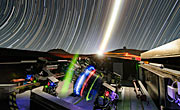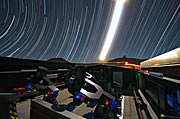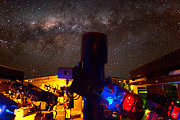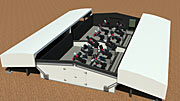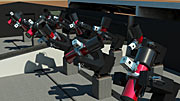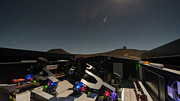Press Release
New Exoplanet-hunting Telescopes on Paranal
NGTS facility achieves first light
14 January 2015
The Next-Generation Transit Survey (NGTS) has achieved first light at ESO’s Paranal Observatory in northern Chile. This project will search for transiting exoplanets — planets that pass in front of their parent star and hence produce a slight dimming of the star’s light that can be detected by sensitive instruments. The telescopes will focus on discovering Neptune-sized and smaller planets, with diameters between two and eight times that of Earth.
The Next-Generation Transit Survey (NGTS) is a wide-field observing system made up of an array of twelve telescopes, each with an aperture of 20 centimetres [1]. This new facility, built by a UK, Swiss and German consortium, is located at ESO’s Paranal Observatory in northern Chile and benefits from the superb observing conditions and excellent support facilities available at this site.
“We needed a site where there were many clear nights and the air was clear and dry so that we could make very accurate measurements as often as possible — Paranal was the best choice by far,” says Don Pollacco of the University of Warwick in the UK and one of the NGTS project leads.
NGTS is designed to operate in a robotic mode and it will continuously monitor the brightness of hundreds of thousands of comparatively bright stars in the southern skies. It is searching for transiting exoplanets and will reach a level of accuracy in measuring the brightness of stars — one part in a thousand — that has never before been attained with a ground-based wide-field survey instrument [2].
This great accuracy of brightness measurement, across a wide field, is technically demanding, but all the key technologies needed for NGTS were demonstrated using a smaller prototype system, which operated on La Palma in the Canary Islands during 2009 and 2010. NGTS also builds on the success of the SuperWASP experiment, which up to now leads in the detection of large gaseous planets.
The discoveries of NGTS will be studied further using other larger telescopes, including the ESO Very Large Telescope. One goal is to find small planets that are bright enough for the planetary mass to be measured. This will allow planetary densities to be deduced, which in turn provides clues about the composition of the planets. It may also be possible to probe the atmospheres of the exoplanets whilst they are in transit. During the transit some of the star’s light passes through the planet’s atmosphere, if it has one, and leaves a tiny, but detectable, signature. So far only a few such very delicate observations have been made, but NGTS should provide many more potential targets.
This is the first telescope project hosted, but not operated, by ESO on Paranal. Several telescope projects operating under similar arrangements are already at work at the older La Silla Observatory. The NGTS data will flow into the ESO archive system and will be available to astronomers worldwide for decades to come.
Peter Wheatley, one of the NGTS project leads from the University of Warwick, concludes: “We are excited to begin our search for small planets around nearby stars. The NGTS discoveries, and follow-up observations by telescopes on the ground and in space, will be important steps in our quest to study the atmospheres and composition of small planets such as the Earth.”
The NGTS Consortium is composed of the University of Warwick, UK; the Queen’s University of Belfast, UK; the University of Leicester, UK; the University of Cambridge, UK; Geneva University, Switzerland and DLR Berlin, Germany.
Notes
[1] The NGTS telescopes are modified versions of small high-quality commercial telescopes made by Astro Systeme Austria (ASA) while the robotic telescope mounts are manufactured by Optical Mechanics Inc (OMI) (http://www.opticalmechanics.com). The NGTS cameras are modified ikon-L cameras by Andor Technology Ltd (http://www.andor.com) built around red-sensitive deep-depletion CCDs by e2v (http://www.e2v.com). The NGTS robotic enclosure building was designed and built by GR Pro Ltd (http://www.grpro.co.uk).
[2] NASA’s orbiting Kepler mission has a higher accuracy of stellar brightness measurement but probes a smaller region of the sky than NGTS. The wider NGTS search will find brighter examples of small exoplanets that are better suited for detailed study.
More information
ESO is the foremost intergovernmental astronomy organisation in Europe and the world’s most productive ground-based astronomical observatory by far. It is supported by 15 countries: Austria, Belgium, Brazil, Czechia, Denmark, France, Finland, Germany, Italy, the Netherlands, Portugal, Spain, Sweden, Switzerland and the United Kingdom. ESO carries out an ambitious programme focused on the design, construction and operation of powerful ground-based observing facilities enabling astronomers to make important scientific discoveries. ESO also plays a leading role in promoting and organising cooperation in astronomical research. ESO operates three unique world-class observing sites in Chile: La Silla, Paranal and Chajnantor. At Paranal, ESO operates the Very Large Telescope, the world’s most advanced visible-light astronomical observatory and two survey telescopes. VISTA works in the infrared and is the world’s largest survey telescope and the VLT Survey Telescope is the largest telescope designed to exclusively survey the skies in visible light. ESO is a major partner in ALMA, the largest astronomical project in existence. And on Cerro Armazones, close to Paranal, ESO is building the 39-metre European Extremely Large Telescope, the E-ELT, which will become “the world’s biggest eye on the sky”.
Links
Contacts
Peter Wheatley
University of Warwick
Coventry, United Kingdom
Tel: +44 247 657 4330
Email: P.J.Wheatley@warwick.ac.uk
Heike Rauer
Deutsches Zentrum für Luft- und Raumfahrt (DLR) / Institut für Planetenforschung
Berlin, Germany
Tel: +49 30 67055 430
Email: heike.rauer@dlr.de
Stéphane Udry
Observatoire de l’Université de Genève
Geneva, Switzerland
Tel: +41 22 379 24 67
Email: stephane.udry@unige.ch
Ather Mirza
University of Leicester
Leicester, United Kingdom
Tel: +44 116 252 3335
Email: pressoffice@le.ac.uk
David Azocar
Universidad de Chile
Santiago, Chile
Email: dazocar@das.uchile.cl
Richard Hook
ESO Public Information Officer
Garching bei München, Germany
Tel: +49 89 3200 6655
Email: rhook@eso.org
About the Release
| Release No.: | eso1502 |
| Name: | Next-Generation Transit Survey |
| Type: | Unspecified : Technology |
| Facility: | Next-Generation Transit Survey |
Our use of Cookies
We use cookies that are essential for accessing our websites and using our services. We also use cookies to analyse, measure and improve our websites’ performance, to enable content sharing via social media and to display media content hosted on third-party platforms.
ESO Cookies Policy
The European Organisation for Astronomical Research in the Southern Hemisphere (ESO) is the pre-eminent intergovernmental science and technology organisation in astronomy. It carries out an ambitious programme focused on the design, construction and operation of powerful ground-based observing facilities for astronomy.
This Cookies Policy is intended to provide clarity by outlining the cookies used on the ESO public websites, their functions, the options you have for controlling them, and the ways you can contact us for additional details.
What are cookies?
Cookies are small pieces of data stored on your device by websites you visit. They serve various purposes, such as remembering login credentials and preferences and enhance your browsing experience.
Categories of cookies we use
Essential cookies (always active): These cookies are strictly necessary for the proper functioning of our website. Without these cookies, the website cannot operate correctly, and certain services, such as logging in or accessing secure areas, may not be available; because they are essential for the website’s operation, they cannot be disabled.
Functional Cookies: These cookies enhance your browsing experience by enabling additional features and personalization, such as remembering your preferences and settings. While not strictly necessary for the website to function, they improve usability and convenience; these cookies are only placed if you provide your consent.
Analytics cookies: These cookies collect information about how visitors interact with our website, such as which pages are visited most often and how users navigate the site. This data helps us improve website performance, optimize content, and enhance the user experience; these cookies are only placed if you provide your consent. We use the following analytics cookies.
Matomo Cookies:
This website uses Matomo (formerly Piwik), an open source software which enables the statistical analysis of website visits. Matomo uses cookies (text files) which are saved on your computer and which allow us to analyze how you use our website. The website user information generated by the cookies will only be saved on the servers of our IT Department. We use this information to analyze www.eso.org visits and to prepare reports on website activities. These data will not be disclosed to third parties.
On behalf of ESO, Matomo will use this information for the purpose of evaluating your use of the website, compiling reports on website activity and providing other services relating to website activity and internet usage.
Matomo cookies settings:
Additional Third-party cookies on ESO websites: some of our pages display content from external providers, e.g. YouTube.
Such third-party services are outside of ESO control and may, at any time, change their terms of service, use of cookies, etc.
YouTube: Some videos on the ESO website are embedded from ESO’s official YouTube channel. We have enabled YouTube’s privacy-enhanced mode, meaning that no cookies are set unless the user actively clicks on the video to play it. Additionally, in this mode, YouTube does not store any personally identifiable cookie data for embedded video playbacks. For more details, please refer to YouTube’s embedding videos information page.
Cookies can also be classified based on the following elements.
Regarding the domain, there are:
- First-party cookies, set by the website you are currently visiting. They are stored by the same domain that you are browsing and are used to enhance your experience on that site;
- Third-party cookies, set by a domain other than the one you are currently visiting.
As for their duration, cookies can be:
- Browser-session cookies, which are deleted when the user closes the browser;
- Stored cookies, which stay on the user's device for a predetermined period of time.
How to manage cookies
Cookie settings: You can modify your cookie choices for the ESO webpages at any time by clicking on the link Cookie settings at the bottom of any page.
In your browser: If you wish to delete cookies or instruct your browser to delete or block cookies by default, please visit the help pages of your browser:
Please be aware that if you delete or decline cookies, certain functionalities of our website may be not be available and your browsing experience may be affected.
You can set most browsers to prevent any cookies being placed on your device, but you may then have to manually adjust some preferences every time you visit a site/page. And some services and functionalities may not work properly at all (e.g. profile logging-in, shop check out).
Updates to the ESO Cookies Policy
The ESO Cookies Policy may be subject to future updates, which will be made available on this page.
Additional information
For any queries related to cookies, please contact: pdprATesoDOTorg.
As ESO public webpages are managed by our Department of Communication, your questions will be dealt with the support of the said Department.

